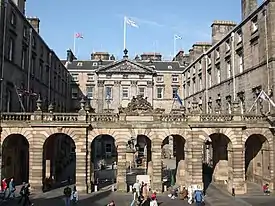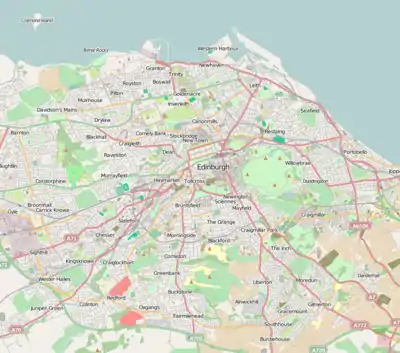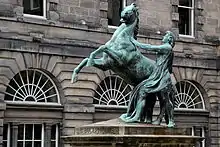Edinburgh City Chambers
Edinburgh City Chambers in Edinburgh, Scotland, is the meeting place of the City of Edinburgh Council and its predecessors, Edinburgh Corporation and Edinburgh District Council. It is a Category A listed building.[1]
| Edinburgh City Chambers | |
|---|---|
 Edinburgh City Chambers viewed across the Royal Mile from the Mercat Cross in Parliament Square | |
| Location | Edinburgh |
| Coordinates | 55.9503°N 3.1904°W |
| Built | 1760 |
| Architect | John Adam |
Listed Building – Category A | |
| Designated | 14 December 1970 |
| Reference no. | LB17597 |
 Shown in Edinburgh | |
History
The current building was originally built as the Royal Exchange, which was funded by subscription and commissioned in 1753.[2] It was designed by John Adam with detail alterations by John Fergus.[1] The building works absorbed many small streets, commonly known in Edinburgh as "closes", that ran north to south across the breadth of the site. The Royal Exchange building sat partially on top of the truncated buildings on the closes that were subsequently blocked-off. These now underground closes were still accessible but were closed for public access for many years until reopened as 'The Real Mary King's Close'.[3] The Exchange was opened by Lord Provost George Drummond in 1760.[4]
The exchange had a coffee shop and shops including a millinery operated by Sibilla Hutton.[5] The Exchange never proved popular with the merchants, for whom it was built, who persisted in meeting at the Mercat Cross or, rather, where it stood before it was removed in 1756.[6] The Town Council took over the north range in 1811 as the City Chambers and by 1893 had bought the whole building.[7]
The City Chambers initially housed Edinburgh Town Council from 1893 to 1895, when that body was replaced by Edinburgh Corporation. It remained the Corporation's headquarters until it was replaced by Edinburgh District Council under the wider Lothian Regional Council in May 1975.[8] It then remained the Edinburgh District Council headquarters until the abolition of the Lothian Region led to the formation of Edinburgh City Council in April 1996.[9]
The City Chambers were used as a filming location for the film Braveheart in 1995[10] and for the TV series Belgravia in 2019.[11]
Architecture
The main building is set back from the High Street behind a quadrangle fronted by a groin-vaulted open arcade screen facing the street. There is a prominent bronze statue of Alexander Taming Bucephalus, by John Steell, in the quadrangle. This was modelled in 1832 but not cast in bronze until 1883.[12] It stood in St Andrew Square until 1916.[13]
The "Stone of Remembrance", within the arcade on the High Street, commemorates residents of the royal burgh who lost their lives in the First World War. The monument was unveiled by Prince Henry on Armistice Day in 1927.[14]
The bronze statue in the north east corner of the quadrangle is of General Stanisław Maczek, a Polish Second World War tank commander who was instrumental in the Allied liberation of France, and who lived in Edinburgh for the last 46 years of his life. The statue, which was unveiled in 2018, is the work of the Polish sculptor, Bronislaw Krzysztof.[15][16]
Most of the interior and all of the main Council Chambers date from 1875 to 1890 and are by the City Architect of the time, Robert Morham. He also built the north-west wing in 1898 and the arched arcade fronting the courtyard in 1901.[17] The east and west wings on the Royal Mile are by the later City Architect Ebenezer James MacRae in the 1930s.[17] The west wing replaced the printworks of William Chambers where Chambers Dictionary was first published.[18]
 The former Royal Exchange, Edinburgh
The former Royal Exchange, Edinburgh Edinburgh City Chambers from Cockburn Street
Edinburgh City Chambers from Cockburn Street
 The bench and statue of General Stanisław Maczek
The bench and statue of General Stanisław Maczek
See also
References
- Historic Environment Scotland. "City Chambers, 245-249 High Street (even numbers), 253 High Street, 323 High Street, 329 High Street, 2 Warriston's Close and 14 Cockburn Street, Edinburgh (Category A Listed Building) (LB17597)". Retrieved 18 April 2019.
- "The Book of the Old Edinburgh Club" (PDF). Retrieved 13 April 2020.
- "Mary King's Close". BBC World Service. Retrieved 23 March 2013.
- "George Drummond". Royal Bank of Scotland. Retrieved 13 April 2020.
- "Hutton, Sibilla (d. 1808), milliner and shopkeeper". Oxford Dictionary of National Biography (online ed.). Oxford University Press. 2004. doi:10.1093/ref:odnb/65574. Retrieved 7 August 2020. (Subscription or UK public library membership required.)
- Grant, James. Old and New Edinburgh. Vol. 1. Retrieved 22 October 2012.
- Historic Environment Scotland. "Edinburgh, 245-329 High Street, City Chambers (52307)". Canmore. Retrieved 13 April 2020.
- "Local Government (Scotland) Act 1973". Legislation.gov.uk. Retrieved 16 April 2020.
- "The City of Edinburgh Council". Edinburgh Live. Retrieved 13 April 2020.
- "Braveheart". Movie Locations. Retrieved 13 April 2020.
- Rhona Shennan (16 March 2020). "Belgravia filming locations in Edinburgh". Edinburgh Evening News. Retrieved 29 April 2020.
- Gillon, Jack; McAuley, Paul (2015). Monumental Edinburgh. Amberley Publishing. ISBN 978-1445650074.
- Buildings of Scotland:Edinburgh by McWilliam Gifford and Walker
- "Stone of Remembrance". Edinburgh Guide. Retrieved 13 April 2020.
- "Statue plan for Polish WW2 general who worked in Capital". Edinburgh Evening news. 12 March 2017. Retrieved 15 November 2020.
- Brown, Graham (24 October 2018). "VIDEO: Statue of war hero General Maczek installed thanks to late Angus peer's memorial campaign". The Courier. Retrieved 18 July 2019.
- "Edinburgh City Chambers". Dictionary of Scottish Architects. Retrieved 13 April 2020.
- Cassell's Old and New Edinburgh vol. II p. 223